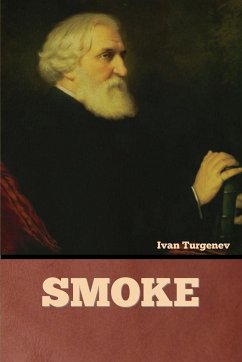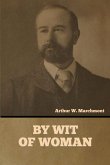Smoke is an 1867 novel by the Russian writer Ivan Turgenev (1818-1883) that tells the story of a love affair between a young Russian man and a young married Russian woman while also delivering the author's criticism of Russia and Russians of the period. The story takes place largely in the German resort town of Baden-Baden. Ivan Turgenev began work on what was to become Smoke in late 1865 and it's known that he carried a finished manuscript of the novel with him when he visited Russia in early 1867. In St. Petersburg, in February 1867, he gave several public charity readings from chapters of the book, all of which were met with approbation. bSmoke was first published in the March 1867 issue of The Russian Messenger (¿¿¿¿¿¿¿ ¿¿¿¿¿¿¿ Russkiy vestnik), one of the premier literary magazine of nineteenth century Russia. The reception to Turgenev's public readings was a bellwether, for upon publication in Russia the novel was met with almost immediate and universal condemnation in that country. Conservatives were enraged by his portrayal of the nobility, Slavophiles denounced Turgenev for denigrating his native Russia, while revolutionaries called the author a senile dodderer incapable or unwilling to appreciate young Russians' strength and will. As for Alexander Herzen, the exiled revolutionary the likes of whom Turgenev satirized in the character of Gubaryov, he wrote a largely negative review of the work in his revolutionary publication The Bell. The criticism of the novel for its supposed "anti-Russian" attitude arose from the fact that Smoke, more than simply a story of a ménage à trois (or even ménage à quatre) and a failed loved affair, is a Roman à thèse, meant largely to display in ironical or farcical light the different strata of Russian society and to offer a political critique on the problems Russia was facing and the shortcomings of Russia's would-be saviours. Indeed, Smoke is a deeply satirical novel aimed not only at the conservative elements of Russian society who stubbornly refused reform and modernization but also at those Russian Slavophiles Turgenev had witnessed first hand abroad, more specifically Alexander Herzen and his young followers, who were rejecting European culture and glorifying a Slav mysticism in their campaign to remake Russia, and in the process badgering Turgenev for what appeared to them as his slavish adoration of European culture. In this, Turgenev focuses his ire on two groups that play prominently in the novel. On the one hand are a group of aristocratic "generals" who are resident in Baden and who form part of the entourage surrounding Litvinov's love interest Irina (and one of whom, General Ratmirov, is her husband). Their apparent disdain for Russia includes a pernicious chauvinism. Opposing them is a mixed group of radicals, who represent a new Slavophile socialism that is at least in part derived from the ideas of Herzen and his circle. Thus, for Turgenev, the similarities between them, rather than the surface opposition, lie at the heart of his criticism. Both groups deal in abstracts; both are far removed from any practical realities; and both ignore what for Turgenev remains the necessary element for the future of Russia: hard work in the context of the lessons of Western "civilization" in the broadest sense and above all concrete practicality. That viewpoint is presented by one of Turgenev's most problematic protagonists, Sozont Potugin, whose unsuccessful personal life stands in sharp contrast with the forcefulness of his Westernist views. (wikipedia.org)








